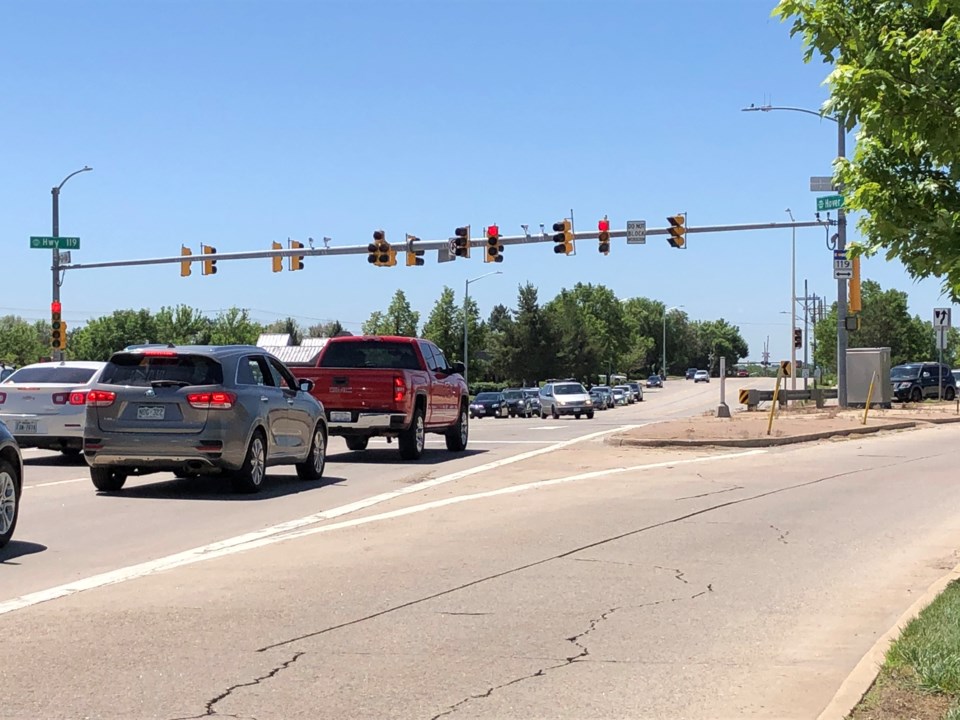As the vision for Diagonal Highway is solidified, some of the busiest intersections along the corridor could see major changes.
At an online meeting Monday, representatives from Boulder County, Colorado Department of Transportation and Regional Transportation District outlined the dual transportation projects currently in the works for Colo. 119, known as Diagonal Highway.
Boulder County is working on a commuter bikeway that would go along the median of Diagonal Highway in conjunction with CDOT and RTD’s Colo. 119 Safety and Mobility Project meant to improve intersections and speed up transit along the corridor.
The projects are estimated to cost a total of $122 million, of which $91 million have been funded.
CDOT Region 4 Director Heather Paddock explained that the state agency has prioritized $40 million in the first four years for the project and another $25 million in the next four.
“Although funds identified today do not fully fund the vision outlined in the planning and environmental linkage study done on this corridor, they provide adequate funding that bring the greatest benefit and facilitate future investments by minimizing construction impacts to the community in the future and eliminate duplicate or throwaway work,” Paddock said.
Adnana Murtic, CDOT project manager, outlined the safety issues with the Diagonal corridor. Colo. 119 is currently the highest crash corridor in Boulder County for motorists and second highest for bicyclists, with over 900 vehicle crashes, 17 bicycle crashes and four fatalities from 2015-2019.
Additionally, the corridor lacks a safe and direct way to travel by bike from Boulder to Longmont, bus transit between the cities is often slow and unreliable, and traffic along the corridor is expected to increase 25% by 2040.
According to Murtic, the safety designs are expected to prevent 370 vehicle crashes in the 20 years following the improvement while the commuter bikeway is expected to eliminate bike crashes. She said the upgrades along the road could cut transit travel times in half and increase ridership by 33%.
Each intersection along Colo. 119 will see safety and roadway upgrades for drivers and bikers, but some of the biggest changes will be at the intersections with Colo. 52 and Airport Road.
At the intersection with Airport Road, CDOT is proposing a change in access to the intersections. The strip of roadway connecting the two intersections of Colo. 119 would become a one-way in the northbound direction, while southbound Airport Road and northbound Ogallala Road would be right turn only.
“There’s several facets at work as to why we’re making this change at 119 and Airport Road, but some of the key considerations were safety at these two intersections, operations of the corridor — how we can move vehicles and buses safely along the corridor — and also facilitating the proposed (Bus Rapid Transit) routes,” said Steven Humphrey, consultant project manager.
At Colo. 52, there is currently only one intersection for northbound and southbound traffic on the Diagonal, leading to long queuing of cars. The design proposed by CDOT would separate out the intersections to improve traffic flow.
“Cars back up quite a bit longer than you might expect,” Humphrey said. “There will be traffic quite a distance from the intersection, leading to crashes between distracted drivers and those cars that are stopped in front of them.”
As for the commuter bikeway, it will be plowed throughout the wintertime and feature underpasses at major cross streets along with connections to the RTD stops and other existing bike networks. There will be street level crossings at minor roadways, but work will be done to ensure safe visibility for bikers and drivers.
Intersection safety improvements include new traffic signals, signing, pavement markings and lighting along with better synchronization of traffic signals that will be responsive to real time traffic conditions.
The Bus Rapid Transit will connect downtown Boulder to north Longmont and will eventually replace the Bolt service. To improve the speed of transit along Colo. 119, bus stops will have their own queue bypass lane and separate signals that allow the bus to get ahead of general traffic before merging, making it faster than traditional bus service.
The final designs of both projects are expected in the summer of 2023 with the final community meeting on the corridor improvements. The partners are actively seeking the additional $31 million needed to finish the project.
“When we go to bid for construction next year, we will build the project elements we have funding for,” Murtic said.
Those funded elements include the roadway safety and operation improvements, queue bypass lanes, park and rides, BRT stations and bikeway underpasses. Construction could begin in early 2024.
Learn more and submit comments about the projects at www.codot.gov/projects/co119-mobility-design/june-community-meeting and www.bouldercounty.org/transportation/plans-and-projects/highway-119-bikeway-project/.



